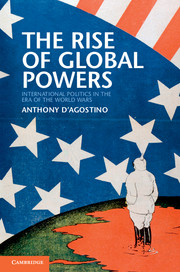Book contents
- Frontmatter
- Contents
- Maps
- Acknowledgements
- Introduction
- 1 The great powers at the dawn of world politics
- 2 Global origins of World War I: from the China scramble to the world crisis of 1904–1906
- 3 Global origins of World War I: a chain of revolutionary events across the world island
- 4 Balance and revolution, 1914–1918
- 5 A ragged peace, 1919
- 6 Scramble for Eurasia, 1919–1922
- 7 Drastic acts of unhappy powers, 1922–1923
- 8 Storms in the lull, 1924–1927
- 9 Politics and economics of the great slump, 1928–1933
- 10 A vogue for national economy
- 11 Mussolini’s moment, 1933–1935
- 12 The global civil war, 1936–1937
- 13 Last years of peace, 1937–1939
- 14 The European war, 1939–1941
- 15 The world war
- 16 Balance and hegemony
- Maps
- Notes
- Index
2 - Global origins of World War I: from the China scramble to the world crisis of 1904–1906
Published online by Cambridge University Press: 05 June 2012
- Frontmatter
- Contents
- Maps
- Acknowledgements
- Introduction
- 1 The great powers at the dawn of world politics
- 2 Global origins of World War I: from the China scramble to the world crisis of 1904–1906
- 3 Global origins of World War I: a chain of revolutionary events across the world island
- 4 Balance and revolution, 1914–1918
- 5 A ragged peace, 1919
- 6 Scramble for Eurasia, 1919–1922
- 7 Drastic acts of unhappy powers, 1922–1923
- 8 Storms in the lull, 1924–1927
- 9 Politics and economics of the great slump, 1928–1933
- 10 A vogue for national economy
- 11 Mussolini’s moment, 1933–1935
- 12 The global civil war, 1936–1937
- 13 Last years of peace, 1937–1939
- 14 The European war, 1939–1941
- 15 The world war
- 16 Balance and hegemony
- Maps
- Notes
- Index
Summary
Perhaps the Koreans are right to teach their young people that the era of the world wars began with the Japanese attack on Korea in 1895. The interpretation might be called Asiacentric, or Koreacentric, but it might also be an improvement on the Eurocentric proposition that the world wars were really only a single European civil war, a twentieth-century version of the Thirty Years War. Debates about the European events that caused the two world wars largely shaped the craft of European diplomatic history as it was known for most of the twentieth century. The mold was established by the international discussion in the 1920s about the guilt of the Germans for the outbreak of war in 1914. There was an obvious stake in the debate; the reparations regime imposed by the Allies, under which the Germans had to subsidize the victors’ recovery from the war, was underpinned morally by the idea that the Germans had started it. Knowing this, the German Foreign Ministry fed the historians’ debate by releasing several collections of diplomatic documents, the most formidable of which was Die grosse Politik der europäischen Kabinette, and helped the work of many British and American historians who in turn, perhaps not very surprisingly, established in the works they published during the next decade that the immediate origins of the war in the crisis of August 1914 had been much more complex than the Versailles Treaty would have had the world believe. Not to say that the historians who in these works created the field of diplomatic history were all duped by the German Foreign Ministry. They set a standard for research and narrative that has not been surpassed. They established the case against the Versailles Treaty’s War Guilt clause that appears in most textbooks today. Even so, the debate ended abruptly when the Germans stopped paying reparations in 1931.
Since that time we have been supplementing and detailing the picture that the earlier debate developed. We have looked at events much more closely and have assigned guilt rather more proportionately among all the powers, except the British. In the process, some have come to conclude that the topic of the immediate origins of the war in the crisis of 1914 was exhausted and that diplomatic history itself, depending so much on foreign ministry documents, had become a study of “what one clerk wrote to another.” It was this historiography that moved Fernand Braudel to complain of the “factitious panoramas” of history based on the short time span. Braudel and his school favored a history with a grander time frame and what became a turn away from the study of power. But Braudel also loved to trace events across intellectual boundaries. Let us try something similar with the Great War and its origins in the dawn of world politics at the turn of the twentieth century in the scramble for concessions on the China coast.
- Type
- Chapter
- Information
- The Rise of Global PowersInternational Politics in the Era of the World Wars, pp. 35 - 47Publisher: Cambridge University PressPrint publication year: 2011



